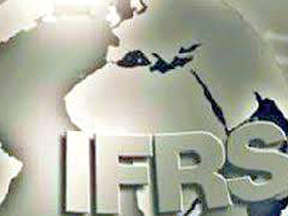IFRS convergence, moving towards global consistency
International Financial Reporting Standards (“IFRS”) convergence is
not just another accounting transformation; it may very well be a
paradigm change for business itself KPMG Partner in Sri Lanka and IFRS
Head for KPMG Middle East and South Asia region Reyaz Mihular said.
Global outlook
 Companies in over 100 countries already follow IFRS when preparing
financial statements. IFRS based financial statements are a requirement
in the majority of these countries and permitted by the others. A
further number of countries are presently exploring conversion and
convergence plans which could enable IFRS to potentially become a
consistent global platform for financial reporting. Companies in over 100 countries already follow IFRS when preparing
financial statements. IFRS based financial statements are a requirement
in the majority of these countries and permitted by the others. A
further number of countries are presently exploring conversion and
convergence plans which could enable IFRS to potentially become a
consistent global platform for financial reporting.
Business opportunity
The move to IFRS based standards opens new opportunities for
businesses facilitating easier access to capital markets, promoting
global consistency, reaching wider stakeholder groups and simplifying
financial processes. The changeover should not be seen as a complexity
but instead perceived as a business opportunity.
The transition
We are part of a global village and it is difficult for any country
to function in isolation. Even giant economies such as India and China
have embraced IFRS. In my view one of the main reasons for IFRS
convergence is that “accountants need to talk a common language”.
The transition is happening because today’s global context requires
accounting statements that can be universally understood. When there is
universal understanding and acceptance it would lead to greater
transparency and comparability which in turn provides increased
assurance and comfort to stakeholders.
Local outlook
 Foreign Direct Investment (FDI) plays a major role in Sri Lanka’s
development plans. In order to attract increased FDI we must attempt to
create a conducive environment in all aspects of the economic
environment. This includes having globally consistent financial
reporting. Foreign Direct Investment (FDI) plays a major role in Sri Lanka’s
development plans. In order to attract increased FDI we must attempt to
create a conducive environment in all aspects of the economic
environment. This includes having globally consistent financial
reporting.
My experience has been that investors prefer investing in familiar
environments.
When operating in unfamiliar environments they are likely to consider
the comfort gap and factor in a return to compensate for the additional
risk or sometimes not invest at all.
If the environment is familiar there is no gap and hence no premium.
Considering on going operations, consolidation becomes much easier and
less costly under IFRS which is globally consistent.
Rationale
IFRS contributes to reporting financial performance as true to its
economic circumstances. Some of the traditional standards have been
challenged and refined standards developed over the years.
This has significantly contributed to the advancement of accounting
standards and the entire accounting profession. For example the
traditional “Historical Cost” is not reflective of the current day
circumstances. It is very rare for someone to consider selling a company
or a land at its cost or net book value.
IFRS moves the Balance Sheet closer to real market values and is thus
more realistic. I also believe that IFRS brings better substance into
financial statements and improves presentation of financial performance
through fair value based reporting.
Advantage
There are many positive outcomes which could be realized through a
successful transformation.
These include; convenient access to global capital markets, eased
cross-border stock-exchange listings, ability to attract and provide
transparency to, international investors, joint venture partners and
lenders comparability and benchmarking with international peers and best
performing global companies avoids multiple reporting for companies with
global operations having subsidiaries and associates in Sri Lanka can be
used as a trigger to streamline and improve financial reporting
policies, processes and IT systems
Difference from traditional accounting
IFRS is much broader than traditional accounting standards. The
standards place a business perspective to the entire financial reporting
process.
We no longer report on past performance but assess impacts in
volatile markets and report proactively in a more timely and realistic
manner.
IFRS is not just another set of accounting standards or a revision to
an existing standard.
It has become a business imperative which influences processes,
people, systems, perspectives and the way in which we communicate
business performance.
The involvement of business decision makers is also fundamental when
preparing financial statements based on IFRS as the process involves
considering financial statement impacts before making key business
decisions.
Preparation in Sri Lanka
The convergence of Sri Lanka Accounting Standards (“SLAS”) with IFRS
is a transition which has been under careful consideration for a few
years.
The new standards will be adopted in Sri Lanka as SLFRS and LKAS. I
believe necessary planning has taken place at professional institution
and regulatory level. Considering the adoption, some of the larger
companies have been proactive in the process.
We are currently working with a number of such banks and
conglomerates who have already prepared financial statements according
to these standards and are better prepared for the transition.
The main advantage for them is the availability of comparators which
could be used when applying the new standards in financial statements.
They would also have their systems and processes better realigned to
meet the new reporting requirements. As the 2012 time line approaches it
is advantageous for directors and financial managers to prepare
themselves and their organizations for preparing financial statements
according to the new standards.
Our experience has been that countries where establishments have been
better prepared have had a smoother transition and embraced the
standards. Even if bottlenecks are experienced these could be resolved
prior to the timelines imposed by regulators and professional bodes.
The challenge and complexity often arises when companies are not
adequately prepared or wait until the deadline to make the transition.
This is a dangerous scenario because they may not be adequately
prepared and changes to financial reporting processes and systems will
invariably take reasonable time to perform.
Adoption
The adoption will often require a gap analysis of key impact areas
and also assessing the changes to systems, processes and training
requirements for people. The extent of impact would depend on the nature
of the organization and the complexity of transactions involved.
Depending on the scenario, consideration would need to be made in
areas such as financial instruments, impairment, investment property,
intangible assets among many others. |



